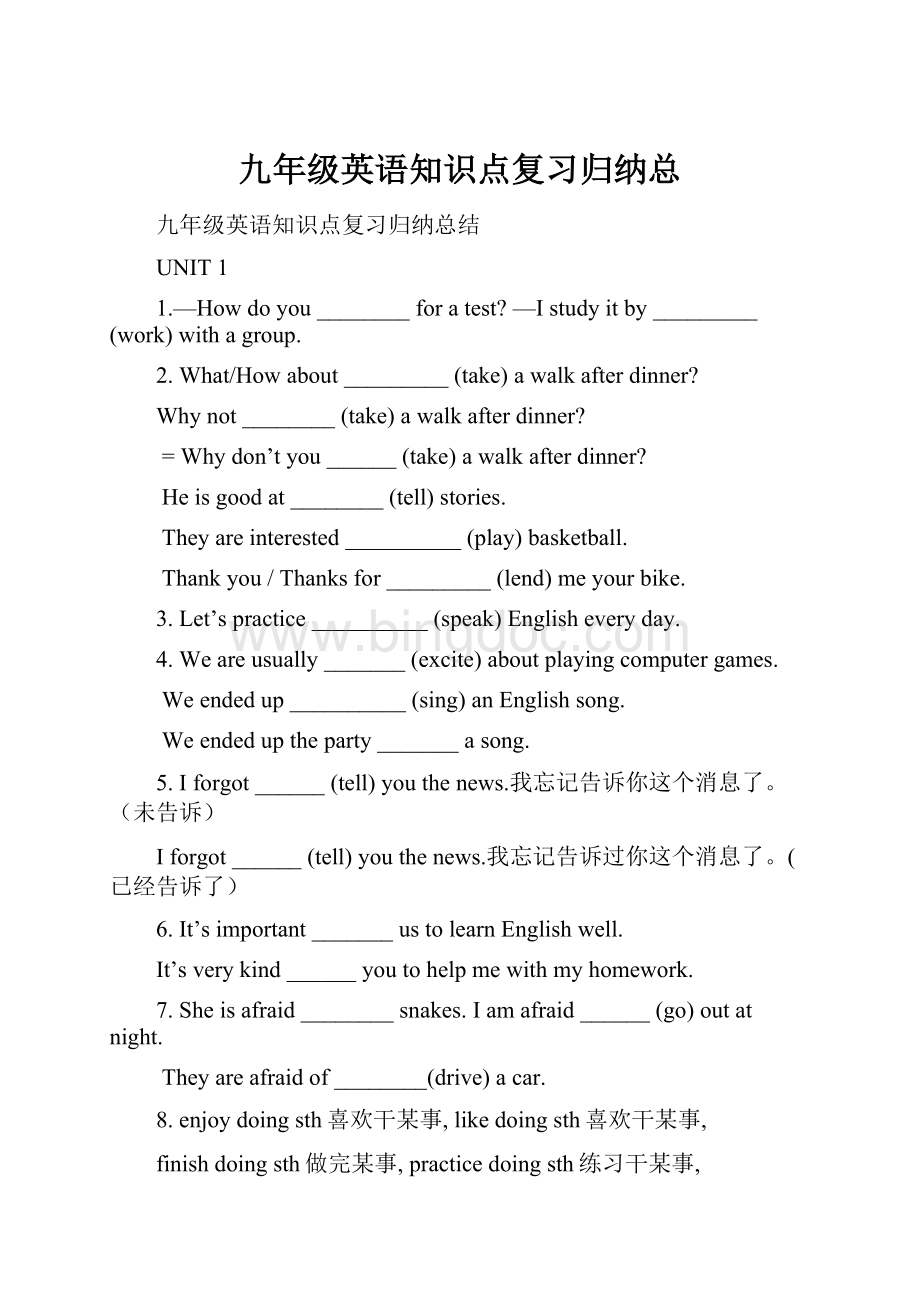九年级英语知识点复习归纳总.docx
《九年级英语知识点复习归纳总.docx》由会员分享,可在线阅读,更多相关《九年级英语知识点复习归纳总.docx(21页珍藏版)》请在冰点文库上搜索。

九年级英语知识点复习归纳总
九年级英语知识点复习归纳总结
UNIT1
1.—Howdoyou________foratest?
—Istudyitby_________(work)withagroup.
2.What/Howabout_________(take)awalkafterdinner?
Whynot________(take)awalkafterdinner?
=Whydon’tyou______(take)awalkafterdinner?
Heisgoodat________(tell)stories.
Theyareinterested__________(play)basketball.
Thankyou/Thanksfor_________(lend)meyourbike.
3.Let’spractice__________(speak)Englisheveryday.
4.Weareusually_______(excite)aboutplayingcomputergames.
Weendedup__________(sing)anEnglishsong.
Weendeduptheparty_______asong.
5.Iforgot______(tell)youthenews.我忘记告诉你这个消息了。
(未告诉)
Iforgot______(tell)youthenews.我忘记告诉过你这个消息了。
(已经告诉了)
6.It’simportant_______ustolearnEnglishwell.
It’sverykind______youtohelpmewithmyhomework.
7.Sheisafraid________snakes.Iamafraid______(go)outatnight.
Theyareafraidof________(drive)acar.
8.enjoydoingsth喜欢干某事,likedoingsth喜欢干某事,
finishdoingsth做完某事,practicedoingsth练习干某事,
keepdoingsth一直干某事,feellikedoing想要干某事,
minddoingsth介意干某事,bebusydoingsth=bebusywithsth.忙着干某事,
giveupdoingsth放弃干某事,stopdoingsth停止干某事。
stayupdoingsth.熬夜做某事can’tstanddoingsth.忍受不了做某事
9._______didtheydealwiththeaccident?
Whatdidthey_______withtheaccident?
10.Weregardourteachers_______ourfriends.
11.Hedecided_______(finish)hishomeworkfirst.
Hemadea_________(decide)tofinishhishomeworkfirst.
He_______uphismindtofinishhishomeworkfirst.
Theydecided_____________(notgo)touniversity.
12.With_______(we)teachers’help,wegotgoodgrades.
________thehelpofourteachers,wegotgoodgrades.
_________ourteachers’help,wecouldn’tgetgoodgrades.
13.Wewillholdasoccerballmatchifit_____________(rain)tomorrow.
=Wewillholdasoccerballmatch________itrainstomorrow.
14与angry连用的短语有:
be/getangry.“(变得)生气”。
stayangry“(一直)生气”。
beangrywith=bemadat=beannoyedwith“生……的气”
15.Wehavetrouble__________(learn)Englishwell.
UNIT2
1.a.Iusedto_______(be)afraidofthedark.我过去害怕黑。
肯定句式:
Sbusedtodosth.
否定句式:
Sbdidn’tusetodosth.或Sbusedn’ttodosth.
一般疑问句式:
Didsbusetodosth?
或Usedsbtodosth?
Weusedto______(play)alotafterschool.→We____(notusetoplayalotafterschool.
→________you______(use)toplayalotafterschool?
—Yes,wedid./No,wedidn’t.
b.Weareusedto__________(exercise)everymorning.
c.Knivesareused_______(cut)things.=Knivesareusedfor________(cut)things.
2.Iusedtobe________ofinsects,andIusedtobe_________ofsnakes.(afraid/terrified)
3.Mum,don’tworry________mystudy.
Theyoungwomanis__________(worry)aboutherweight.
4.It_________(seem)thathegotangry.
Heseemed_________(get)angry.
5.Thehouseistooexpensive.Wecan’tafford___________(buy)it.
6.intheend=atlast.“最后、终于”。
7.Hewasn’tgoodatsports._______oursurprise,hedidbestinthesportsmeeting.
8.Wetake______inZhaiZhigang.=Weare________ofZhaiZhigang.
Weareproud_________(win)thegame.
9.Myparentsalwayspayattention_______mystudy.
Asastudent,weshouldpayattentionto_________(finish)ourhomeworkontime.
10.changeone’smind,“改变某人的想法/决定……”。
UNIT3
1.a.Teachersdon’tallow________(talk)inclass.老师不允许在课堂上谈话。
b.I’m___________(allow)towatchTVonweekends.
c.Thestudentsshould_______________(allow)toplaysportsafterschool.
2.Ourheadteacherisalwaysstrict________usandheisalsostrict__________hisjob.
3.当主句中的谓语动词是think(想)、suppose(猜想)、believe(相信)等时,如果从句是否定,则要把从句的否定前移到主句,构成Idon’tthink/suppose/believe…….“我认为/猜测/相信……不……。
”即:
否定前移。
I____________(think)Jim______________(notcome)tomypartytomorrow.
4.Myhairistoolong.I’llhaveit_________(cut)thisafternoon.
Teachersalwaystrytheirbesttomakethemeasily_______________(understand).
5.Thestudentsstop___________(talk)whentheteachercomesin.
Hewasverytiredandhestopped____________(have)arest.
Theheavyrainstoppedusfrom________(play)soccerballoutside.
stopsb/sth(from)doingsth=preventsb/sth(from)doingsth
=keepsb/sthfromdoingsth.阻止某人/某物干某事。
Ican’tstop___________(laugh)whenIheardit.
can’tstopdoingsth=can’thelpdoingsth.“忍不住……,无法不……”。
5.a.倒装句常用来谈论两个人或物同时符合一个情况。
肯定倒装句:
so+be动词、情态动词或助动词/(do/does或did)+sb。
“某人也一样……”。
否定倒装句:
neither/either/nor+be动词、情态动词或助动词/(do/does或did)+sb。
“某人也一样不……”。
b.—It’scold,butsunnytoday.—Soitis.今天冷但很晴朗。
的确如此。
Soitis.是一个陈述句。
用于两个人谈论同一件事,其中一个人也同意另一个人的观点。
常用于对话中。
(1)Wehadfunintheparkyesterday,so_______ourparents.
(2)Hehasbeentothatmuseummanytimes,so________I.
(3)Idon’tlikecoffee,neither________mybrother.
(4)Theywon’tgotoBeijingonvacation,________willI.
(5)Hehasn’tbeentotheGreatWallbefore,nor______I.
(6)—Heworksveryhard.
—.And.
A.Sodoeshe,sodoyouB.Sohedoes,sodoyou
C.Sohedoes,soyoudoD.Sodoeshe,soyoudo
6.Now,moreandmorechildrenareseriousabout________(play)computergames.
7.用took,spent,paid,cost填空
◎I________10yuanforthatbook.
◎She_________100yuanonherdress.
◎It________hertendollars.
◎It________hertenhourstofinishit.
Theyspenthalfayear___(build)thebridge.
※Ittakessbsometimetodosth
※Sbspendssometime/moneydoingsth
Sbspendssometime/moneyonsth
※Sbpaidmoneyforsth.
※Sthcost+money/Sthcostsb+money
8.stayup“熬夜”。
stayupdoingsth.
9.Studentsconcentrated_________takingnotesinclass.
10.IlearnEnglish______myEnglishteacher.=MyEnglishteacher______(teach)English.
11.Ihaveanopportunity___________(do)thevolunteerwork.
12.Grammargetsintheway________learningEnglishwell.
13.careabouta.“关心”。
b.“在乎、在意”多用于否定句中。
14.表达同意与不同意时要用到:
Iagree.Idisagree.Idon’tagree.
15.Theytalkinsteadof________(do)homework.
UNIT4
1.虚拟语气表示的是一种不可能实现的假设、愿望、建议想像、猜测或纯粹的空想。
也即表示与事实相反的假设。
结构为:
(条件从句)If+主语+动词过去式,(结果主句)主语+would+动词原形。
当条件状语从句的谓语动词是be动词时,均用were。
IfI______(be)you,Iwouldcallhimup.
Ifyou________(work)hard,you_______________(pass)theexam.
Ifhewereyou,he______________(ask)ourteachersforhelp.
IfI_________(have)money,I_________________(buy)alotofrosesforyou.
2.Whatif=Whatwouldhappenif……“如果……怎么办?
、即使……又有什么关系?
”。
Whatifhe______________(help)us?
___________yourparentsdon’tallowyoutogowithus?
WhatifIdon’tknowtheway_________thestation?
3.a.too……todosth,“太……而不能……”。
Hewastooexcited__________(say)aword.他太兴奋了而不能说一句话。
b.too……forsbtodosth,“对某人来说太……而不能……。
”
Thequestionwastoo_____________(difficulty)forustoanswer.
Thehouseistooexpensiveforme____________(buy).
c.too……todosth,句型可以与so……that……句型互换。
相同点是它们中间都只能接形容词或副词的原形;而不同点是to后接动词不定式,而that后接一个从句(句子)。
Heistooyoung________(go)toschool.=Heissoyoung_______hecan’tgotoschool.
d.too……todosth,还可以与not……enoughtodosth互换。
Heistooyoungtogotoschool.=Heisn’t________enoughtogotoschool.
5.Theywouldrather________(walk)therethan__________(go)therebybus.
6.Yesterday,they____________(have)agoodtimeatthepartyintheslightest.
Yesterday,theydidn’thaveagoodtimeattheparty________________..
7.Heisfriendly.Healwaysgets____________wellwithhisfriends.
8.plentyof“很多的”既可修饰可数名词,也可修饰不可数名词。
一般用于肯定句中。
Theyhaveplentyof_________(friend)inthatcity.他们在那个城市有很多的朋友。
Wehaveplentyof__________(water)todrink.我们有足够的饮用水。
9.Tryyour_________,anddon’tletus_________.尽你最大努力,不要让我们失望。
10.giveadvice,“提建议”;advice是一个不可数名词,所以givesbapieceofadvice“给某人提建议”;askforone’sadvice“向某人征求意见”;takeone’sadvice“接受某人的意见(劝告)。
”
Thisbookgivesussome_________(advice)onhowtolearnEnglishwell.
UNIT5
1.—Whosebookisthis?
—ItmustbeMary’s.WandaWilburisherfavoriteauthor.
用must,could,might,can’t对事物表示推定和推测。
must意为“肯定,必定,必须”,即认定有100%的可能性。
常被用来指所认定的事情是真实存在的。
could和might意为“也许、可能、或许”,事物的真实性一般在20-80%之间,没有十足的把握。
而can’t则是对事物的真实性持否定态度,其可能性为0,意为“绝对不可能、肯定不是”。
eg.a.—Whosebasketballisthis?
—ItbeJack’s.Hedoesn’tlikeit.
b.ThetennisracketbelongtoMissLiu.Shelovesplayingtennisverymuch.
c.Ican’tfindmybackpack.Ileaveitontheplayground.
d.ThisdictionarybeAnn’s.Ithashernameonit.
e.Theearringsbeaboy’s.
另外,must有“应该、必须、一定”之意,其否定形式为mustn’t,意为“不准,不允许,禁止”。
所以must提问作肯定回答仍用must,但作否定回答时,要用needn’t,意为“不必”。
如:
—MustItakeoutthetrashatonce?
—.Youcantakeitoutafteryoufinishyourhomework.
A.Yes,youmustB.No,youmustn’tC.No,youneedn’tD.No,youcan’t
2.Theyare___________(worry/anxious)aboutthecomingsoccerballmatch.
because与becauseof“因为”的区别:
because是一个连词,用来引导原因状语从句(接一个句子);而becauseof则是一个介词短语,后面只能接名词、代词或动词的ing形式(接一个词组)。
Wehavetoputoffthesportsmeeting___________(because/becauseof)itisraining.
Wehavetoputoffthesportsmeeting____________(because/becauseof)therain.
3.Therearesomeboys___________(play)soccerballontheplayground.
There_______(be/have)somebirds___________(fly)highinthesky.
UNIT6
1.在英语中,用一个句子作定语修饰名词或代词时,这个句子被称作定语从句。
被定语从句所修饰的名词或代词叫先行词。
引导定语从句的词叫引导词。
引导词在句中作用有二:
一是起引导作用,二是在句中作一定成分。
用引导词填空
Ilovesingers________writetheirownmusic.
Heistheman________Italkedaboutyesterday.
Roselikesmusic________isquietandgentle.
Theflowers_______wehaveplantedgrowwell.
Carmenlikesmusiciansplaydifferentkindsofmusic.
Ilikemusicthat_______reallyloudandenergetic.
Theyoungpeopleplaysbasketballverywellismybrother.
Thegirl__________motherisateacherisMary.
Sanyaisthecity__________weatheriswarminwinter.
Thisisthefacto